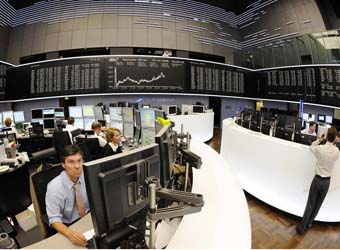European stocks closed lower on Monday with banking and oil stocks leading the declines.
The pan-European Stoxx 600 closed down 0.49 percent.
Meanwhile, the U.K.’s FTSE 100 rose more than 0.38 percent to a new record high, aided by a fall in the U.K. pound following “hard Brexit” comments made by Prime Minister Theresa May over the weekend. A falling pound should help exporters.
The autos sector was one of the top performers on Monday, up by 0.39 percent. Volkswagen was up 4.5 percent on reports that it was about to reach a $4 billion-plus deal to settle its emission-cheating scandal with the U.S. Justice Department. A Senior VW manager Oliver Schmidt was arrested and is expected to appear in court later Monday charged with trying to defraud the United States, Reuters said.
Meanwhile, telecom stocks continued lower on Monday, as Vodafone fell 1.6 percent after UBS cut its target price on the company. Travel and leisure stocks also dipped with the German airline Lufthansa near the bottom of European benchmarks, sinking more than 6 percent.
Banking stocks became the worst performers during afternoon trade, dropping more than 1.6 percent. A Reuters poll indicated Monday that traders expect another announcement reducing the ECB’s quantitative easing program as early as April.
Meanwhile in the U.S., the Dow Jones industrial average opened slightly lower on Monday as traders were forced to wait patiently for the blue-chips index to pass the 20,000 threshold.
In corporate news, the French drugmaker Ipsen was up 0.35 percent after it said it would buy some assets of Merrimack.
The CEO of the British house builder Bovis Homes has decided to step down after the company failed to meet its construction target for 2016. Shares were up almost 1 percent on Monday.
On the data front, the euro zone unemployment rate remained at 9.8 percent in November. The Halifax house price index in the U.K. increased 1.7 percent month-on-month in December, the highest figure since last March, Reuters reported.
New figures also showed German industrial production went up for a second month in a row in November and exports rose by 3.9 percent, giving further evidence of an economic rebound in the largest EU economy, Reuters reported.
“Today’s data finally bring some evidence that the German economy gained momentum in the final quarter of the year. Even though industrial data is still not living up to the expectations created by buoyant soft indicators, the surge in exports and the gradual recovery of industrial production brings some relief for a battered industry,” Carsten Brzeski, chief economist at ING, said in an email.
Source: CNBC


